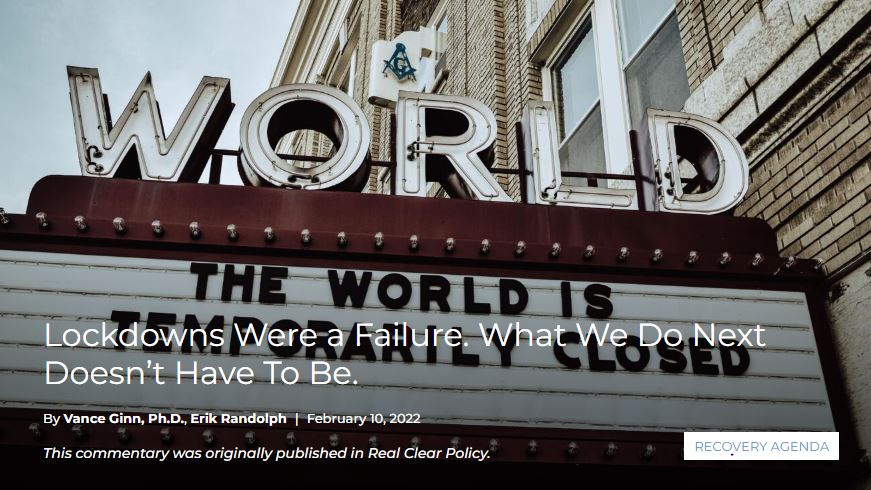 There’s new evidence government-imposed shutdowns prompted by the COVID-19 pandemic have done more harm than good. Instead, a better choice is keeping the economy open so people stay connected to work and targeting resources to vulnerable populations. A new meta-analysis from Johns Hopkins University underscores this finding, revealing that lockdowns in America and Europe during the first pandemic wave in spring 2020 only reduced the death rate by 0.2% on average. Researchers concluded that lockdowns “have had little to no public health effects” while imposing “enormous economic and social costs” and should be “rejected as a pandemic policy instrument.” While businesses were shuttered, people were forced to stay home, and schools remained closed, the unintended social and economic consequences were clear: Rising unemployment, learning loss among students, spiking rates of domestic violence, and a pandemic-level rise in drug abuse and overdoses. All of that social and economic devastation yielded a minimal impact on health-related suffering due to COVID-19. The new research from Johns Hopkins mirrors our own findings in a recent nationwide study, which found that overreaction by states to waves of the pandemic did substantial damage without much benefit in reducing the effects of the pandemic. The research shows a statistical correlation between how severe state governmental actions were in shutting down their economies and negative impacts on employment more than a year after the pandemic began in America. This was the case even after controlling for a state’s dependence on tourism or agriculture, population density, and the prevalence of COVID-19 infections and hospitalizations. Our research found no correlations between the severity of shutdowns imposed by state governments and the rate of reported COVID-19 hospitalizations or deaths. States like Hawaii, New York, California, and New Mexico that imposed harsher economic restrictions generally have greater job losses even today than those states that were less harsh, such as South Dakota, Iowa, Nebraska, Missouri, and Utah. For example, New York was 10.2% below its trajectory in October 2021 while Nebraska was just 2.4% below. The bottom line is that while policymakers were likely working in good faith to do their best in a challenging situation, it’s crucial we learn from these past mistakes so that we don’t repeat them. And make no mistake about it—those mistakes have driven untold amounts of human suffering during the past two years. The worst part is that the government-imposed shutdowns created even more barriers for people who were already struggling. Every American was impacted, of course. These interventions created challenges and burdens for the middle and upper classes, but for our poorest communities they were outright damaging. Protecting the rights and opportunities of workers to earn a living is obvious. Equally important are the psychological benefits that come with the dignity of work. And there are socio-economic benefits from work that positively impact everyone, such as building social capital and gaining skills, which are especially important for those in marginalized communities who were most impacted by the shutdowns. As the states look for a long-term strategy to deal with the pandemic, it is paramount that they consider the empirical evidence and not impose burdensome restrictions—such as business closures, stay-at-home orders, school closures, gathering restrictions, and capacity limits—on economic activity that have proven to do more harm than good. Instead, the policies need to be crafted more carefully to expand opportunities for the poor and preserve jobs in an open economy in which entrepreneurs can solve problems while taking measures when necessary to protect vulnerable populations. These are the policies that should have been done all along to avoid the severity of the shutdown recession and the effects on lives and livelihoods thereafter. Let’s not make another mistake when so many are already suffering. https://www.texaspolicy.com/lockdowns-were-a-failure-what-we-do-next-doesnt-have-to-be/ Comments are closed.
|
Vance Ginn, Ph.D.
|

 RSS Feed
RSS Feed